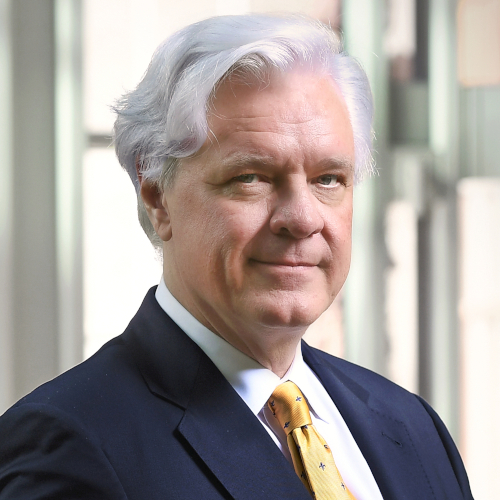Olin’s online MBA: ‘Poised to be world leaders in digital education’
- June 3, 2021
- By Mark Taylor
- 4 minute read

“Are you launching an online MBA at WashU Olin?” Five years ago, when I joined WashU, my answer would have been “probably not,” for a variety of reasons.
But, thanks to the pandemic and my inspiring faculty and staff, I’ve had a change of heart.
The pandemic has shifted the pace of adoption of online education dramatically. Nearly every university in the world had little choice but to go online—and educators and students alike learned that elements of a quality education can be transposed to the online environment.
At Olin, I’m particularly proud of how we exhibited extraordinary creativity, showing how well we could embrace online teaching. Nearly 16 months ago, as the crisis first emerged, the Olin team showed it could pivot to online education and still provide a quality educational experience. This was our immediate, first horizon.
A few months later, with the benefit of that emergency experience and a little more planning time, our team again innovated with hybrid courses (online and in-person) that brought cutting-edge practice and technologies to the classroom as the pandemic persisted. In collaboration with Olin’s lynchpin asset in these efforts, the Center for Digital Education, faculty created curriculum designed for the medium and learned best-in-class techniques for using the technology in teaching. This was our second horizon.
Moving into the third horizon
Now, nearly a year and a half from that first experience, we’re thinking about how the world has changed as a result of the pandemic. About how the adoption of digital technologies in business has advanced and about how being able to lead in the digitally enabled world will be the key to leadership success. This is the third horizon.
I’m delighted that our team has again stepped up and presented an extraordinary plan for a rigorous online MBA program that will be highly differentiated in the marketplace.
And that is key. The imperative to set ourselves apart was central to the work of the task force that developed plans for the OMBA. That’s why our plan goes well beyond simply throwing a traditional MBA program online. That’s why our plan for the OMBA will focus on preparing leaders for a digitally enabled world. And that’s why Olin’s faculty unanimously approved the program once it was presented and the curriculum ironed out.
“How do we think about which technologies are the right ones to use?” said John Horn, professor of practice in economics and co-chair of the OMBA task force in a faculty presentation. “How do we think about what technologies will solve the business problems we face? This is about being a leader and understanding how to use these tools to better your organization.”
Artificial intelligence. Machine learning. The blockchain. The internet of things. Data mining. Facial recognition. Technologies such as these are becoming increasingly ubiquitous and, in our view, leaders must be prepared to understand them and leverage them—while also bringing to bear the core skills of managing an enterprise.
Research informed the OMBA’s development
This focus aligns with the research of that OMBA task force. That team used primary research, focus groups and a deep review of secondary research to build a competitive strategy.
“In order to compete, we understood the importance of designing a truly differentiated online MBA—in curriculum and experience—that met demand,” said Paula Crews, co-chair of the task force and Olin’s senior associate dean for marketing and strategy. “We worked closely with our faculty and Center for Digital Education to design a truly unique online experience to meet those demands of today’s digitally enabled world.”
We’ll begin recruiting for the program next month and anticipate launching our first cohort of about 50 students in the spring. The 54-credit, 30-month program includes a heavy load of traditional core courses and a selection of more than 20 electives in nine functional business areas.
“The demand is there now,” said Ohad Kadan, vice dean for education and globalization. “We need to go out with this program, especially with what’s going on out there right now. The demand is out there. There is significant growth in demand for the online MBA program.”
Students will also be expected to complete something of a capstone that will begin at the start of their program—a “digital impact project” aimed at creating “a high-potential digital initiative” for their employer, or a future employer. Each semester, and with the guidance of the program’s faculty, students will lay groundwork for and iterate on that project as they continue their education.
‘For the world of tomorrow’
“Every single case doesn’t have to be about a digital company,” Horn said. “We didn’t see this as limiting or narrowly focused. What we’re trying to do is train you for the world of tomorrow.”
With faculty approval for the program, Trish Gorman, professor of practice of strategy, and Patrick Moreton, professor of practice in strategy and management, have taken the reins as joint academic directors and are now bringing the vision to fruition.
At the same time, work has advanced toward the launch of our new online graduate programs in accounting, finance and analytics—programs that, indeed, were envisioned before the pandemic. These programs provide learners the chance to earn certificates in their field as they advance through the coursework. The stackable certificates culminate in a specialized masters degree.
We knew we had to distinguish the online MBA from our existing full-time MBA. It’s filling a different need. With our world-class faculty, with the Center for Digital Education and with the vision we bring to the third horizon, we are poised to be world leaders in digital education. All these assets give us a comparative—maybe an absolute—advantage in this space.
Media inquiries
For assistance with media inquiries and to find faculty experts, please contact Washington University Marketing & Communications.
Monday–Friday, 8:30 to 5 p.m.
Sara Savat
Senior News Director, Business and Social Sciences
